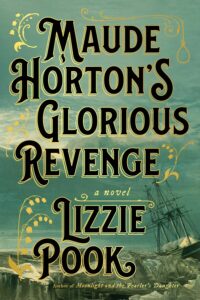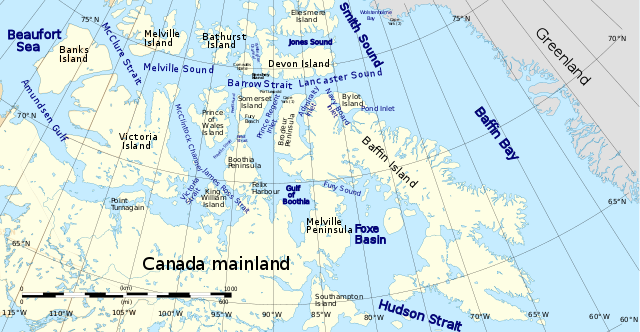
Sensational novel inspired by Victorian sensationalism (London, Salisbury, York, England, and the Northwest Passage; 1849 to 1851): “What is life if not loaded with risk?” asks one of the leading characters narrating this gripping historical novel.
The question gives us an inkling into what’s in store for the intrepid literary adventurer on the darker side of Victorian England – on land and the death-defying Artic seas.
Two historical events inspired the two storylines in British travel writer and novelist Lizzie Pook’s Maude Horton’s Glorious Revenge, depicting the best and worst of human nature. Would her novel be quite as sensational if she weren’t “obsessed” as she says with “shipwrecks and adventure,” and hadn’t traveled to faraway places including the Arctic?
An unfair question that doesn’t take into account Pook’s skills on display: a wild imagination, perception of people’s motives, historical research, and finding just the right word to suit the suspense and gruesomeness. Unfamiliar Victorian history becomes vivid, connecting two seemingly distinct storylines.
The technique deployed in this British Naval mystery is Columbo-esque: we’re told who the murderer is at the beginning. The challenge, risks, and dangers are to track down the evidence to prove it. Opening with, “Let us begin at the end, shall we?” we fall under Pook’s spell.
Know what that entails. A novel that’s not for the faint-of-heart. BUT don’t turn away as I almost did, because this blog has steered away from the ghastly. “Bring on the ghouls! the disturbed mind of the suspected murderer, Edison Stowe, excitedly feels. Buoyed though by the Columbo-style investigator, Maude Horton, whose beauty, like Peter Falk’s frumpy appearance, conceals what they’re up to. He savvy from the first episode; she evolves from “reserved” and risk-adverse into a woman who “isn’t distracted by pomp” or “old-fashioned notions of swashbuckling men.” Oh, how we love the making of a strong woman!
Pook’s Victorian England is set when “murder was all you read about in the papers.” Helps sell them especially when “murder mania” swept through London, Salisbury, and York – the land settings; and when the young victim, Maude’s sister, writes at sea that “tales of madness are not hard to come by here in the Arctic” – the sea mystery. Greed and scheming to make money above all else thrives and chills. One of the epigraphs quoted clues us into that theme, from 1842 by the legendary, defunct Punch magazine:
“Murder is doubtless, a very shocking offence; nevertheless, as what is done is not to be undone, let us make our money of it.”
Money-making is also the underlining quest aboard a fictional sailing vessel, the Makepeace, its crew representing Britain’s high and lower social classes. Not the stated, primary mission: to follow the same fated Northwest Passage route famous British explorer Sir John Holland took and never returned from. Holland’s sailing vessels were two sister ships named Terror and Erebus; Pook’s creative version includes a second ship too, The High Regard.
Ironic name the Makepeace, as nothing peaceful happens when Maude’s slightly younger twenty-two-year-old sister Constance, the daring adventuress, disguised herself as a man, as an overlooked “cabin’s boy,” surreptitiously came onboard. She too never returns home. BBC’s series, The Terror, is based on Holland’s disappearance, a mystery that was solved. Pook’s will be too, but not until the bitter end.
Maude Horton’s voice alternates with Constance’s, who on the ship goes by the name Jack Aldridge. Maude’s is a first-person narrative; Constance/Jack comes to us through a journal she hid. Maude received it two years after the naval authorities referred to her sister’s disappearance as a “misadventure,” screaming cover-up. Reading it, Maude breaks free and the investigation is afoot.
Maude’s devotion to Constance, having raised her with their kindly grandfather when their parents died, is deep-seated. The sisters lack experience with men, except it seems with only their grandfather who taught them valuable lessons on “science and art.” A chemist, they lived in his pharmacy, where they developed a keen sense of smell mixing all sorts of medicines. You’ll see how handy this knowledge serves them, though not well enough for Constance aboard a ship of all men. “Monsters are made on ships like ours,” her journal proclaims.
Constance writes about “one good man” who stood out brightly against “dangerous men” who’ve been “sloughed into darkness by lives at sea.” One she calls a “madman.” Constance’s atmospheric entries of a “wild landscape of whalers and lonely seamen” and the “annihilating” wind add to the terror.
The diary fuels the novel’s authenticity, charting Holland’s Northwest Passage sailing “through Baffin Bay and Lancaster Sound, towards King Williams Islands [all in Canada or in-between Greenland], to many islands in Greenland, noting sailing location, longitude, and latitude.

Maude’s repelled by Edison’s “reptilian coldness.” Both sisters’ depictions evoke his creepiness, but it’s Maude who goes after him while Constance is desperate to remain “invisible.” Maude’s the one sees him as close as she can bear. What kind of man reveres bones? Bones from the sea, bones on land when we first meet him, hiding out, too, in a spooky taxidermist’s shop.
Maude’s pursuit of the truth, particularly when her target is a man who denigrates women as “so very vacuous, so very female” we admire. Although we worry she’s gotten herself mixed up way beyond her abilities and physicality, we’re proud of her.
The social reforms during Queen Victoria’s long reign aspired to moral values. To some extent, this helps explain the British fascination with public executions. As many as 30,000 to 50,000 Pook says. All societal classes thronged to witness “spectacles” that turn our stomachs. An insatiable hunger for justice, retribution, and accountability drives the storytelling.
Edison’s mental illness takes a while to pull together. Evil, cruel, he delights in inflicting pain on women, men, and animals. Playing psychologist, might he be diagnosed with sadistic personality disorder? Not psychopathy characterized by empty emotions. We eventually learn the origins of his mental demise, drastically different than how he perceives himself: above most people, a man of “quality” whose been unfairly treated. England’s fanaticism with barbaric public acts befits him.
Pook writes of the past with an eye toward relevancy. Today’s political battles for Justice and Accountability for one thing. The second message applies to Artic exploration speeding up now that warming temperatures are melting ice caps, opening up the conquering of the Northwest Passage. NPR reports the Artic is “heating up twice as fast as the rest of earth,” enabling a Race to the Artic. Resembling the tensions of the US-Soviet space race, with more countries wanting to grab the untapped resources of the planet’s Last Frontier (see: PBS, Politico, Air University).
There’s a long and diverse list of Victorian history and literary references woven in, so take the literary risk if you’re the squeamish type. A sensational Victorian journey on land and sea awaits.
Lorraine